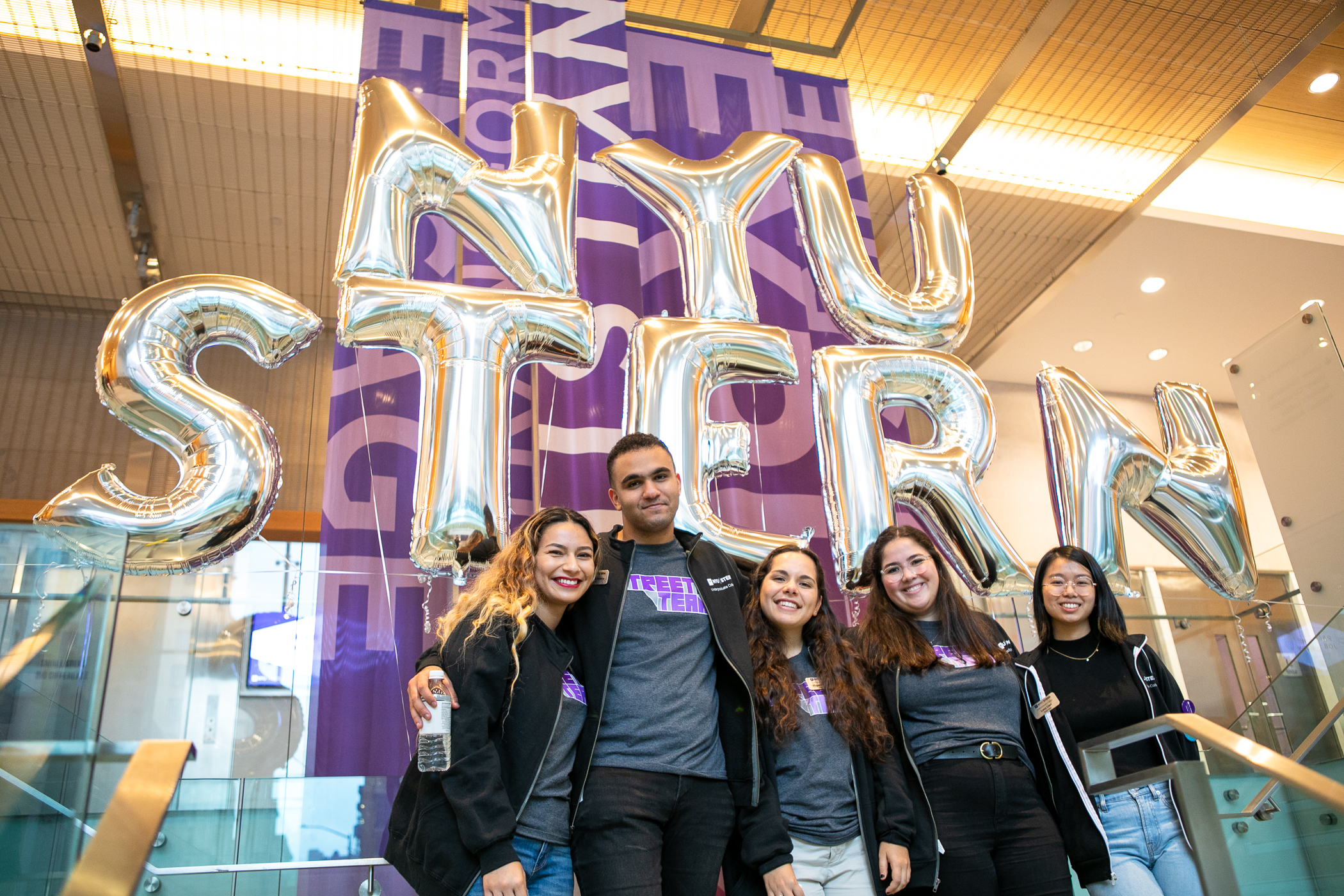
Students from New York University’s Stern School of Business
New York University, Stern School of Business
NYU Stern has enjoyed quite a two year run in P&Q’s undergraduate business school rankings. After placing 8th in 2018, the school has since climbed to 6th and now 4th.
The surge is partially due to the program’s increasingly strong inputs and outputs. Just 7.6% of applicants are accepted into Stern – the fourth-lowest rate in the country. Making it all the more exclusive is the 1492 SAT scores of those who are talented enough to be accepted – good for sixth-highest in 2019. The outputs are equally impressive, as Stern grads pulled in $85,930 in starting pay in 2019, fourth-best in the country.
The fourth-oldest business school in the United States, NYU Stern also ranked 5th in U.S. News’ ranking of undergraduate business programs, placing 2nd for Finance and 3rd for Marketing. The depth and breadth of the business school – and NYU in general – serves as one of Stern’s biggest strengths. Stern ranks among the largest business schools, with 438 professors across the undergraduate, graduate, and executive programs. NYU itself includes 10 undergraduate schools and programs, which offer over 230 areas of academic study.
To think, all this is expertise is concentrated in one school!
Not surprisingly, the program attracts a certain type of student, says Jonathan Williams, Vice President of Undergraduate Admissions. “What they all have in common is intellectual curiosity, lots of motivation to explore their ideas and their impactful engagement with the world around them.”
It’s not just the caliber of peers and volume of options at Stern that appeals to business students, says Robert Whitelaw, Vice Dean of NYU Stern’s Undergraduate College. It is also the structure and flexibility of the curriculum.
“Our curriculum has more than 40 elective credits, which is more than is typical, to use to pursue interests across NYU and Stern through double majors and minors, to study away for multiple semesters, or even take a graduate-level course. We truly feel that college is the time to explore your interests and try out different areas of study and we want to make sure students have as much opportunity to do that as possible. Through our Business, Liberal Arts, and Social Impact Cores, we prepare students to broaden their minds, learn in different ways, become more reflective, and develop a flexible and creative mindset. Our students have the freedom (and are encouraged) to explore their own interests and develop themselves as human beings with meaning and purpose in life. All of these varied experiences make our students who they are.”
According to P&Q’s December alumni survey, 97% of Stern grads enjoy significant international experience at Stern. In many ways, the students take after the larger New York City community, highly diverse and cosmopolitan. The city boasts a thriving arts scene and startup ecosystem; it is a leader in finance, advertising, fashion, and theater – where the leading companies and thought leaders from every imaginable industry are just a 20-minute cab (or subway) ride away from NYU. In other words, says Robert Whitelaw, students enjoy unparalleled access to business and culture during their four years at NYU.

Robert Whitelaw
“Whether taking in a Broadway show, an art exhibit or a sports event through the Cohen Arts & Culture program or participating in the Tech Trek to firms such as Instagram, Google, and Twitter, students have myriad opportunities to engage in the vibrancy of the city that serves as our extended classroom and expand their horizons. Further, because of our location, students have the opportunity to do internships year-round if they choose. This is the ultimate in experiential learning because they get to try out different industries and work environments in parallel with their classroom studies. We’ve heard time and again from students that having this level of access is one of the great benefits of attending school at NYU Stern.”
The Big Apple digs, coupled with the program’s international perspective, has also created a “glocal” aura – an intersection where students are both ‘in and of the city’ and ‘in and of the world.’ For Andres Gomez Perry, a 2019 Best & Brightest Business Major, ‘glocal’ meant both a diverse student body and a wide range of overseas opportunities.
“My class boasts students from all over the world,” explains the McKinsey analyst from Colombia. “Within my close group of friends, several nationalities are represented—Singapore, Korea, Canada, Mauritius, and Italy. The high level of diversity enriches class discussions, especially in the political economy arena. On the other hand, NYU has eleven study away sites and two additional degree-granting campuses. Through this global network, I was able to spend a year in London at the wake of Brexit, a semester in Shanghai learning about East Asian political economy, a week in Hong Kong for the Stern International Studies Program, and a January term in Abu Dhabi immersing myself in the UAE’s business environment.”
On average, half of the Stern classes spend at least one semester abroad. In fact, Jonathan Williams considers ‘doing business in a global setting’ to be “foundational” to the curriculum. The cornerstone of this programming is the ISP, which enables students to serve as “global ambassadors,” in Whitelaw’s words.
“This spring marks the 20th year of our one-of-a-kind course, the Barr Family International Studies Program (ISP), which every junior at Stern takes. The semester-long course focuses on the principles of international economies and trade and includes an international trip during Spring Break to one of three cities in Asia, Europe, or South America. Students travel overseas together, focus on a specific industry, meet with company executives, and observe a country’s culture firsthand. The experience culminates in the hallmark ISP competition where finalist teams compete in a large performance space to a panel of judges and their ~600 other classmates. ISP is consistently cited as a top memory for our students.”
The ISP is just one component of a far larger international design, Whitelaw adds. “We also integrate international experiences through semesters away through NYU’s 13 global academic centers and our 17 partner business schools in the International Business Exchange (IBEX) program. Through our Stern Around the World short-term immersion programs, students are able to travel as a part of their class. Recent courses have explored business strategy implications due to cultural, economic, political and social structures in Abu Dhabi, Costa Rica, and Ghana. We are delivering a globally relevant, rigorous, broad education that will prepare students for not just their internship or first job, but a successful career in business. These global experiences prepare students to adapt to the ever-changing business environment.”
Along with a global mindset, NYU Stern also steers students towards the greater good – taking responsibility for making a positive impact on the larger society. That’s one reason why the programming is increasingly geared toward social impact.
“Not only is half of the required coursework in the liberal arts, but every student also takes four required social impact courses through the social impact core, which the Carnegie Foundation recognized as an innovative model in undergraduate business education,” Whitelaw explains. Last year, we marked 20 years of teaching social impact and reimagined the first course in the sequence, Business and Society” taken by first-years to align with the UN’s 17 Sustainable Development Goals. As a complement to coursework, we also co-hosted an event with the UN on leveraging digital finance to advance the global goals. Students engaged with representatives from the UN, Google and a range of start-ups about creating fintech solutions for more inclusive digital economies.”
Along the same lines, NYU Stern is investing heavily in areas like sustainability. The goal: staying “relevant” in a rapidly-evolving global business environment that requires resourcefulness as much as digital acumen.
“We are continuously expanding the offerings in our Sustainable Business co-concentration, with new courses such as Sustainability Impact Consulting in Costa Rica to Entrepreneurship in Sustainable Protein now on offer,” Whitelaw concludes. “Most recently, we introduced our newest co-concentration in Entrepreneurship as digital technologies transform the nature of work and an entrepreneurial mindset becomes an imperative to excel–even in established firms. This spring semester we are offering a brand-new elective course in this co-concentration called NYC Entrepreneurship Lab, an experiential class in which students will be paired with one of seven NYC-based early start startups.”











Questions about this article? Email us or leave a comment below.